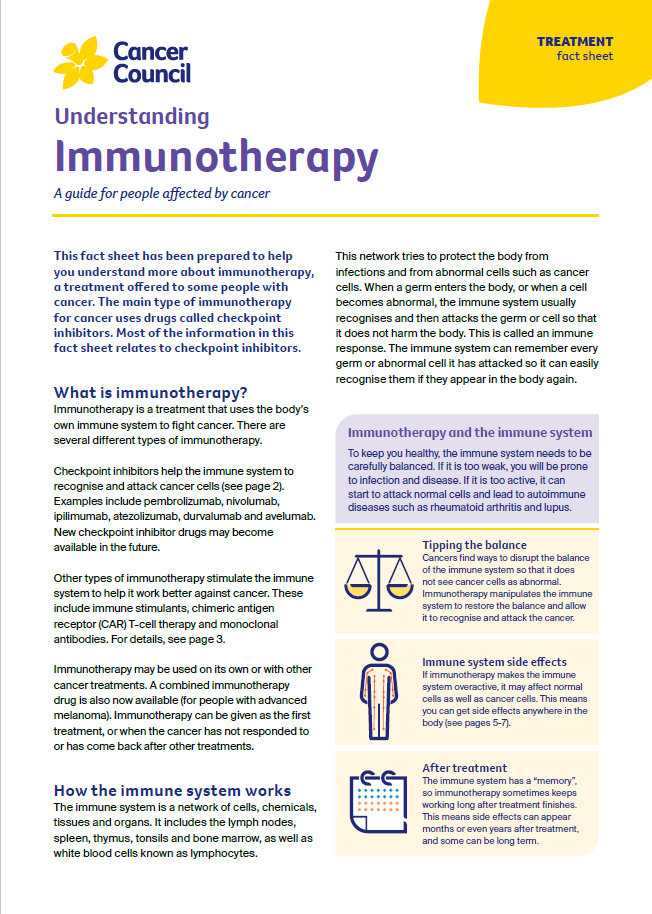- Home
- About Cancer
- Cancer treatment
- Chemotherapy
- Other drug therapies
- Immunotherapy
Immunotherapy
This drug therapy uses the body’s own immune system to attack cancer cells.
Types of immunotherapy
There are several different types of immunotherapy, and each works differently.
- Checkpoint inhibitors are the most common. Checkpoint inhibitors remove barriers that stop the immune system from finding and attacking cancer. Examples include pembrolizumab, nivolumab, ipilimumab and atezolizumab.
- Other types stimulate the immune system to help it work better against cancer. Examples include imiquimod.
Immunotherapy using checkpoint inhibitors is available for some types of cancer, including bladder cancer, head and neck cancer, Hodgkin and non-Hodgkin lymphoma, kidney cancer, liver cancer, lung cancer, melanoma and Merkel cell carcinoma.
It is most often given when cancer has come back after the initial treatment (advanced cancer). For some cancer types, it may be available as part of the first treatment plan.
Side effects of immunotherapy
Checkpoint inhibitors trigger an immune response that can cause side effects such as redness, swelling or pain (inflammation) anywhere in the body. Side effects will depend on which part of the body becomes inflamed.
Common side effects include:
- skin rash and itching
- diarrhoea, abdominal pain and bloating
- pain in the joints
- fatigue
- dry eyes.
Talk to your medical team if you have any side effects.
For more on this, see our general section on Immunotherapy.
Antibody drug conjugate therapy
Antibody drug conjugate (ADC) therapy is being more widely used in Australia to treat some cancers. ADC therapy is when an antibody is joined to chemotherapy medicine. This therapy is targeted at the cancer cells, but can affect other cells. The drug combination attaches to the cancer cells, and destroys them. Ask your oncologist if this treatment is suitable for you.
Video: What is immunotherapy?
Watch this short video to learn more about targeted therapy.
Podcast: Immunotherapy & Targeted Therapy
Listen to more episodes from our podcast for people affected by cancer
More resources
A/Prof Kate Mahon, Director of Medical Oncology, Chris O’Brien Lifehouse, NSW; Katherine Bell, Dietetics Department, Liverpool Hospital, NSW; Brigitta Leben, Dietetics Department, Liverpool Hospital, NSW; Sophie Michele, 13 11 20 Consultant, Cancer Council SA; Dr Jess Smith, Medical Oncologist, Macquarie University Hospital, NSW; Karene Stewart, Consumer; Julie Teraci, Clinical Nurse Consultant, Skin Cancer and Melanoma, Cancer Network WA.
View the Cancer Council NSW editorial policy.
View all publications or call 13 11 20 for free printed copies.

